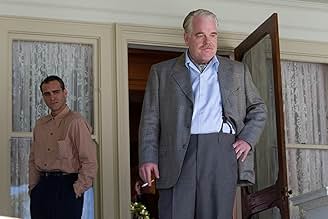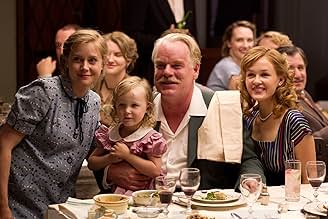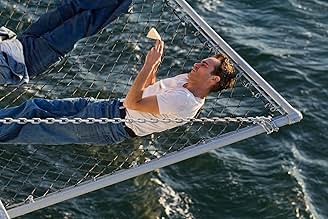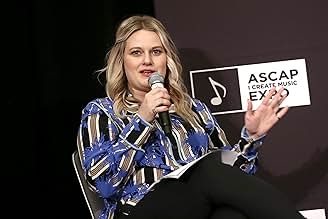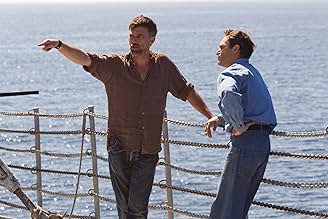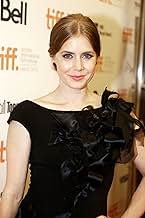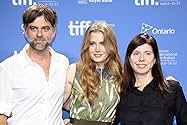द्वितीय विश्व युद्ध के अनुभवी फ्रेडी, युद्ध के बाद के समाज से निपटने में असमर्थ रहते हैं. हालांकि जब वह द कॉज़ नामक एक धार्मिक आंदोलन में जाते हैं, तब उन्हें वहां एकांत मिलता है.द्वितीय विश्व युद्ध के अनुभवी फ्रेडी, युद्ध के बाद के समाज से निपटने में असमर्थ रहते हैं. हालांकि जब वह द कॉज़ नामक एक धार्मिक आंदोलन में जाते हैं, तब उन्हें वहां एकांत मिलता है.द्वितीय विश्व युद्ध के अनुभवी फ्रेडी, युद्ध के बाद के समाज से निपटने में असमर्थ रहते हैं. हालांकि जब वह द कॉज़ नामक एक धार्मिक आंदोलन में जाते हैं, तब उन्हें वहां एकांत मिलता है.
- निर्देशक
- लेखक
- स्टार
- 3 ऑस्कर के लिए नामांकित
- 75 जीत और कुल 187 नामांकन
Patrick Wilder
- V.A. Patient
- (as Patrick Biggs)
फ़ीचर्ड समीक्षाएं
This is one of those films which the critics were nearly-unanimous in offering universal praise and yet audiences seemed to be relatively dismissive. (The film didn't quite make back its money at the box office.) The performances of Joaquin Phoenix, Philip Hoffman, and the rest of the cast were outstanding, along with the dialog which seems perfectly suited to its characters. Even the sets of the late 1940's and early 1950's were superb. And there are a number of surprising moments in which you don't know where the story is headed. However, by the film's end, I felt like there was something missing, as if the filmmakers were reluctant to take a risk with the material and say something about their subject through the story. About the last half of the film, the story meanders and never finds again its pace or goal.
The film is about the obsession of cult groups which try to answer life's riddles for troubled people. In this case, the group and its leader appear very loosely inspired by Scientology and L. Ron Hubbard, called "the Cause" whose leader is Lancaster Dodd (Hoffman). Although Hoffman plays the title role, the story is really about an ex-naval officer Freddie Quell (Phoenix) who is suffering from PTSD as a result of his involvement in World War II. After the war, he is a lost soul roaming through life with a series of misadventures, such as attacking a customer when he works for a department store as a photographer, or accidentally offering a poisonous drink to a migrant worker.
At his lowest point, he wakes up on board some kind of small yacht and meets a strange man, Lancaster Dodd, who informs him he's aboard his ship at Quell's request, although our protagonist can't remember having boarded. Quell learns about Dodd at their first meeting who states "I am a writer, a doctor, a nuclear physicist and a theoretical philosopher, but above all, I am a man, a hopelessly inquisitive man, just like you." He also says people attack him for his "dangerous" ideas. Slowly, Quell learns that Dodd is head of some kind of an underground movement combining philosophy and pseudo-science and publishes books on some far-fetched ideas which probably have no scientific basis. Dodd is often referred to as simply "Master" by members of this group. Dodd and his group believe the way to "heal" troubled people is by cleansing their souls through a hypnotic process which attempts to heal injuries inflicted during past lives.
Probably the most compelling part of the film is the first half, where we as the audience learn about Dodd and the Cause through the eyes of Quell. The most captivating moment is when Dodd is accused of not only illegally accepting a large donation from a philanthropist through a foundation, but practicing medicine without a license. I thought the film would focus on these accusations, but then the film leaves these indictments far behind. Afterwards, the film meanders, a bit like Quell at the beginning. The film becomes an episodic montage of interesting moments which are rather disconnected. By film's end, I didn't feel much more was revealed about Dodd and his Cause than when Quell first joined during the first third of the film.
Although all the acting is right on the money including outstanding performances by Hoffman and Phoenix, and the script dialog was absolutely true the characters, the entire film was kind of dissatisfying. We as the audience are given hints of the politics of Dodd and his inner circle but often these ideas are never fully developed. Also, much screen time was devoted to many of the "past life" sessions conducted by Dodd, but I think at some point it became wasted screen time. After 3 or 4 sessions, I pretty much understood the idea but instead countless others are offered without giving much insight into Dodd and who he is. By film's end, "The Master" was more like a character study than a story. A noble effort that wasn't quite there for me.
The film is about the obsession of cult groups which try to answer life's riddles for troubled people. In this case, the group and its leader appear very loosely inspired by Scientology and L. Ron Hubbard, called "the Cause" whose leader is Lancaster Dodd (Hoffman). Although Hoffman plays the title role, the story is really about an ex-naval officer Freddie Quell (Phoenix) who is suffering from PTSD as a result of his involvement in World War II. After the war, he is a lost soul roaming through life with a series of misadventures, such as attacking a customer when he works for a department store as a photographer, or accidentally offering a poisonous drink to a migrant worker.
At his lowest point, he wakes up on board some kind of small yacht and meets a strange man, Lancaster Dodd, who informs him he's aboard his ship at Quell's request, although our protagonist can't remember having boarded. Quell learns about Dodd at their first meeting who states "I am a writer, a doctor, a nuclear physicist and a theoretical philosopher, but above all, I am a man, a hopelessly inquisitive man, just like you." He also says people attack him for his "dangerous" ideas. Slowly, Quell learns that Dodd is head of some kind of an underground movement combining philosophy and pseudo-science and publishes books on some far-fetched ideas which probably have no scientific basis. Dodd is often referred to as simply "Master" by members of this group. Dodd and his group believe the way to "heal" troubled people is by cleansing their souls through a hypnotic process which attempts to heal injuries inflicted during past lives.
Probably the most compelling part of the film is the first half, where we as the audience learn about Dodd and the Cause through the eyes of Quell. The most captivating moment is when Dodd is accused of not only illegally accepting a large donation from a philanthropist through a foundation, but practicing medicine without a license. I thought the film would focus on these accusations, but then the film leaves these indictments far behind. Afterwards, the film meanders, a bit like Quell at the beginning. The film becomes an episodic montage of interesting moments which are rather disconnected. By film's end, I didn't feel much more was revealed about Dodd and his Cause than when Quell first joined during the first third of the film.
Although all the acting is right on the money including outstanding performances by Hoffman and Phoenix, and the script dialog was absolutely true the characters, the entire film was kind of dissatisfying. We as the audience are given hints of the politics of Dodd and his inner circle but often these ideas are never fully developed. Also, much screen time was devoted to many of the "past life" sessions conducted by Dodd, but I think at some point it became wasted screen time. After 3 or 4 sessions, I pretty much understood the idea but instead countless others are offered without giving much insight into Dodd and who he is. By film's end, "The Master" was more like a character study than a story. A noble effort that wasn't quite there for me.
I will never understand how Phoenix and Hoffman didn't win the Oscars. Specially Joaquin, I truly think it is the best actor performance I ever watched in my life. The movie is great, although is not for everyone, you must watch it with the right mindset and pay attention to every detail. Most new actors should watch this movie to take notes on how to be a better actor. Cheers.
Paul Thomas Anderson has grown as perhaps the greatest American auteur of his generation. At 42, this is his 6th film (following 1996's "Hard Eight", 1997's "Boogie Nights", 1999's "Magnolia" - my all-time favorite -, 2002's "Punch-Drunk Love", and 2007's "There Will Be Blood"). Like the late master Kubrick and the aging master Terrence Malick (who, coincidentally, just debuted his 6th film, "To the Wonder", at the latest Venice Film Festival where PTA won the Silver Lion for Best Director), he isn't the most prolific of filmmakers; but his perfectionist creations, cerebral yet strikingly cinematic and emotional, always leave an indelible mark (polarizing audiences but usually earning critical acclaim). "The Master" is no exception. Shot on 70mm film, it is not so much of an "outside" epic as you'd imagine - although every single image is stunning and perfectly composed (courtesy of cinematographer Mihai Malaimare Jr., who replaced Robert Elswit, Anderson's usual collaborator). It closely resembles "There Will Be Blood" in tone and content, but it stands on its own (Jonny Greenwood is once again responsible for the score).
Freddie Quell (Joaquin Phoenix) is a troubled and troubling drifter who becomes the right-hand man of Lancaster Dodd (actor extraordinaire Philip Seymour Hoffman), "the master" of a cult named The Cause in post-WWII America. Their strange, ambiguous relationship is the center of the film. "The Master" is a thought-provoking indictment of cult fanaticism and lies sold as religion, which has caused controversy and concern among Scientologists even before its release. By not mentioning real names, Anderson is capable of broadening the scope of his story and making it richer - and subtler - than a straightforward "Scientology flick" would have been. Like his previous films, there's more than meets the eye at a single viewing, and his attention to detail pays off (there's also a visual homage to Jonathan Demme's "Melvin and Howard", another favorite of Anderson's, in a motorcycle racing scene). Hoffman is as good as ever, and Amy Adams is highly effective (slowly depriving herself of cutesy mannerisms) as his wife. David Lynch's golden girl Laura Dern has a small role as well. But this is Joaquin Phoenix's hour, all the way. River Phoenix's younger brother has become a fascinating actor himself since Gus Van Sant's dark comedy "To Die For" (1995), and, after his much publicized "retirement from acting" and music career hoax in 2009, he managed to come back with a performance for the ages, which shall culminate in Oscar gold. As for Anderson, it is unsure whether the Academy will finally recognize him as he deserves. His films may still be too outlandish for the Academy's taste (he's announced his next project will be an adaptation of Thomas Pynchon's crime novel "Inherent Vice", a seemingly less ambitious project he hopes to make in less than five years). Regardless of Oscar numbers, we can rest assured that in a world where PTA gets to make such personal and original work and find his audience, there is still hope, and room, for intelligent filmmaking.
Freddie Quell (Joaquin Phoenix) is a troubled and troubling drifter who becomes the right-hand man of Lancaster Dodd (actor extraordinaire Philip Seymour Hoffman), "the master" of a cult named The Cause in post-WWII America. Their strange, ambiguous relationship is the center of the film. "The Master" is a thought-provoking indictment of cult fanaticism and lies sold as religion, which has caused controversy and concern among Scientologists even before its release. By not mentioning real names, Anderson is capable of broadening the scope of his story and making it richer - and subtler - than a straightforward "Scientology flick" would have been. Like his previous films, there's more than meets the eye at a single viewing, and his attention to detail pays off (there's also a visual homage to Jonathan Demme's "Melvin and Howard", another favorite of Anderson's, in a motorcycle racing scene). Hoffman is as good as ever, and Amy Adams is highly effective (slowly depriving herself of cutesy mannerisms) as his wife. David Lynch's golden girl Laura Dern has a small role as well. But this is Joaquin Phoenix's hour, all the way. River Phoenix's younger brother has become a fascinating actor himself since Gus Van Sant's dark comedy "To Die For" (1995), and, after his much publicized "retirement from acting" and music career hoax in 2009, he managed to come back with a performance for the ages, which shall culminate in Oscar gold. As for Anderson, it is unsure whether the Academy will finally recognize him as he deserves. His films may still be too outlandish for the Academy's taste (he's announced his next project will be an adaptation of Thomas Pynchon's crime novel "Inherent Vice", a seemingly less ambitious project he hopes to make in less than five years). Regardless of Oscar numbers, we can rest assured that in a world where PTA gets to make such personal and original work and find his audience, there is still hope, and room, for intelligent filmmaking.
My Rating : 8/10
Inspired by Scientology founder L. Ron Hubbard and the development of a cult, 'The Master' is a drama-piece through and through.
The movie doesn't have a message or goal as such and sort of does it's own thing.
The things worth watching are the terrific performances, weird content and some very fine cinematography.
Inspired by Scientology founder L. Ron Hubbard and the development of a cult, 'The Master' is a drama-piece through and through.
The movie doesn't have a message or goal as such and sort of does it's own thing.
The things worth watching are the terrific performances, weird content and some very fine cinematography.
I had no clue what I was heading into when I pressed play. I think it's really hard to make a bad movie when you have Philip Seymour Hoffman, Jaoquin Phoenix, Amy Adams, and Jesse Plemons leading the charge. Hoffman and Phoenix are fully absorbed into their characters and the film forces its audience to try and follow these conversations that somehow feel super grounded (due to Hoffman's amazing delivery) and unsettling at the same time. This movie really could not have worked without the talent of these actors.
Amy Adams does so much with so little screen time; I do wish we got more time with her but I think her lack of presence contributes to the messaging of the film. She gives an extremely pulled back/subtle performance of a woman that is truly in the middle of the storm.
This feels fresh and distinct from any other movie I've watched, so I'd definitely recommend it.
Amy Adams does so much with so little screen time; I do wish we got more time with her but I think her lack of presence contributes to the messaging of the film. She gives an extremely pulled back/subtle performance of a woman that is truly in the middle of the storm.
This feels fresh and distinct from any other movie I've watched, so I'd definitely recommend it.
क्या आपको पता है
- ट्रिवियाDuring the jail cell scene, Joaquin Phoenix breaks a real toilet. His actions were entirely improvised. Due to the historical past of the building where the scene took place, the toilet was considered "historical." Joaquin had no intentions to break the toilet, nor did he think it was possible.
- गूफ़In the "pacing" scene, as Quell goes from wooden paneled wall to window and back, the second time he goes to he wooden paneling, he breaks out a panel when he pounds it with rage. In the numerous successive shots, the wood panel is restored.
- भाव
Lancaster Dodd: If you figure a way to live without serving a master, any master, then let the rest of us know, will you? For you'd be the first person in the history of the world.
- क्रेज़ी क्रेडिटAfter its title, this film has no further opening credits.
- कनेक्शनEdited into Conspiracy: The Hollywood Syndicate (2015)
- साउंडट्रैकBaton Sparks
From '48 Reponses to Polymorphia'
Written by Jonny Greenwood
Performed by The Aukso Chamber Orchestra
Courtesy of Unreliable Ltd.
टॉप पसंद
रेटिंग देने के लिए साइन-इन करें और वैयक्तिकृत सुझावों के लिए वॉचलिस्ट करें
- How long is The Master?Alexa द्वारा संचालित
विवरण
- रिलीज़ की तारीख़
- कंट्री ऑफ़ ओरिजिन
- भाषाएं
- इस रूप में भी जाना जाता है
- The Master: Todo Hombre Necesita Un Guía
- फ़िल्माने की जगहें
- Mare Island, वेलेजो, कैलिफोर्निया, यूएसए(as Philadelphia, Pennsylvania and various houses, a park and the docks)
- उत्पादन कंपनियां
- IMDbPro पर और कंपनी क्रेडिट देखें
बॉक्स ऑफ़िस
- बजट
- $3,20,00,000(अनुमानित)
- US और कनाडा में सकल
- $1,63,77,274
- US और कनाडा में पहले सप्ताह में कुल कमाई
- $7,36,311
- 16 सित॰ 2012
- दुनिया भर में सकल
- $2,86,89,359
- चलने की अवधि2 घंटे 18 मिनट
- रंग
- ध्वनि मिश्रण
- पक्ष अनुपात
- 1.85 : 1
इस पेज में योगदान दें
किसी बदलाव का सुझाव दें या अनुपलब्ध कॉन्टेंट जोड़ें







